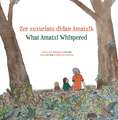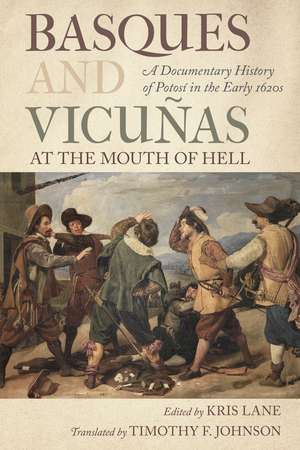Basques and Vicuñas at the Mouth of Hell: A Documentary History of Potosí in the Early 1620s: The Basque Series
Editat de Kris Lane Traducere de Timothy F. Johnsonen Limba Engleză Hardback – 7 noi 2024 – vârsta ani
As mines flooded and Indigenous workers died or fled, the city descended into a maelstrom of swordfights, gun battles, ambushes, sniper attacks, and summary executions. Though its roots were economic, the Basque-Vicuña conflict strained the sinews of Habsburg global governance even as it exposed festering local tensions, only some of which were unique to Potosí.
This rich collection of original sources, all of them archival documents housed in Bolivia, Spain, the United Kingdom, and the United States, consists of contemporary eyewitness accounts from several perspectives, allowing readers to play historian. All sources have been expertly translated and carefully annotated in a manner that will engage students and scholars alike. Basques and Vicuñas at the Mouth of Hell includes an extensive introduction, seven vital documents in translation, and appendices on everyday life in 1620s Potosí and on the historiography of this watershed episode of colonial violence.
Din seria The Basque Series
-
 Preț: 234.03 lei
Preț: 234.03 lei -
 Preț: 207.27 lei
Preț: 207.27 lei -
 Preț: 103.52 lei
Preț: 103.52 lei -
 Preț: 105.36 lei
Preț: 105.36 lei -
 Preț: 410.99 lei
Preț: 410.99 lei -
 Preț: 152.02 lei
Preț: 152.02 lei -
 Preț: 163.79 lei
Preț: 163.79 lei -
 Preț: 141.48 lei
Preț: 141.48 lei -
 Preț: 154.42 lei
Preț: 154.42 lei -
 Preț: 217.84 lei
Preț: 217.84 lei -
 Preț: 229.93 lei
Preț: 229.93 lei - 15%
 Preț: 361.81 lei
Preț: 361.81 lei - 12%
 Preț: 148.50 lei
Preț: 148.50 lei -
 Preț: 152.50 lei
Preț: 152.50 lei - 19%
 Preț: 192.03 lei
Preț: 192.03 lei - 14%
 Preț: 324.05 lei
Preț: 324.05 lei - 18%
 Preț: 276.22 lei
Preț: 276.22 lei -
 Preț: 360.38 lei
Preț: 360.38 lei - 18%
 Preț: 272.17 lei
Preț: 272.17 lei - 20%
 Preț: 166.82 lei
Preț: 166.82 lei - 19%
 Preț: 268.41 lei
Preț: 268.41 lei - 23%
 Preț: 132.50 lei
Preț: 132.50 lei - 30%
 Preț: 235.08 lei
Preț: 235.08 lei - 22%
 Preț: 134.11 lei
Preț: 134.11 lei - 26%
 Preț: 348.99 lei
Preț: 348.99 lei -
 Preț: 137.70 lei
Preț: 137.70 lei - 19%
 Preț: 234.55 lei
Preț: 234.55 lei - 21%
 Preț: 162.94 lei
Preț: 162.94 lei - 21%
 Preț: 162.94 lei
Preț: 162.94 lei - 19%
 Preț: 268.41 lei
Preț: 268.41 lei - 20%
 Preț: 230.50 lei
Preț: 230.50 lei - 13%
 Preț: 361.86 lei
Preț: 361.86 lei -
 Preț: 179.78 lei
Preț: 179.78 lei -
 Preț: 162.70 lei
Preț: 162.70 lei
Preț: 537.74 lei
Preț vechi: 663.87 lei
-19% Nou
Puncte Express: 807
Preț estimativ în valută:
102.90€ • 110.03$ • 85.79£
102.90€ • 110.03$ • 85.79£
Carte disponibilă
Livrare economică 28 martie-11 aprilie
Preluare comenzi: 021 569.72.76
Specificații
ISBN-13: 9781647791384
ISBN-10: 1647791383
Pagini: 472
Dimensiuni: 152 x 229 x 33 mm
Greutate: 0.66 kg
Editura: University of Nevada Press
Colecția University of Nevada Press
Seria The Basque Series
ISBN-10: 1647791383
Pagini: 472
Dimensiuni: 152 x 229 x 33 mm
Greutate: 0.66 kg
Editura: University of Nevada Press
Colecția University of Nevada Press
Seria The Basque Series
Recenzii
“Basques and Vicuñas at the Mouth of Hell is a significant addition to the historiography of colonial Spanish America and deserves a place in any library devoted to general studies and research. The editor’s work is superbly accurate and the translator offers clarity and, at the same time, retains the flavor of the seventeenth-century Castilian.”
—Xabier Lamikiz, associate professor of economic history, University of the Basque Country, author of Trade and Trust in the Eighteenth-Century Atlantic World: Spanish Merchants and Their Overseas Networks
—Xabier Lamikiz, associate professor of economic history, University of the Basque Country, author of Trade and Trust in the Eighteenth-Century Atlantic World: Spanish Merchants and Their Overseas Networks
Notă biografică
Kris Lane holds the France V. Scholes Chair in Colonial Latin American History at Tulane University in New Orleans, Louisiana. He is the author of Pandemic in Potosí: Fear, Loathing, and Public Piety in a Colonial Mining Metropolis; Potosí: The Silver City that Changed the World; Pillaging the Empire: Piracy in the Americas, 1500-1750; Colour of Paradise: Columbian Emerald in the Age of Gunpowder Empires; and Quito 1599: City and Colony in Transition. Lane is currently writing a history of the great Potosí mint fraud of the 1640s.
Timothy F. Johnson is associate professor of Spanish at Central College. His research centers on the early modern connections between literature and warfare, and he has translated several colonial texts in collaboration with Kris Lane, including The Indian Militia and Description of the Indies and Defending the Conquest: Bernardo de Vargas Machuca's Defense and Discourse of the Western Conquests.
Timothy F. Johnson is associate professor of Spanish at Central College. His research centers on the early modern connections between literature and warfare, and he has translated several colonial texts in collaboration with Kris Lane, including The Indian Militia and Description of the Indies and Defending the Conquest: Bernardo de Vargas Machuca's Defense and Discourse of the Western Conquests.
Extras
Excerpt from the Introduction:
At some point in the year 1620, deadly violence erupted in Potosí between those openly identifying as Basque and nearly everyone else, starting with a string of unsolved murders and escalating in mid-1622 to mutual ambushes and near-pitched battles, a “civil war” resembling but outstripping medieval Spanish precedent. Basques and their enemies attacked and retaliated in city and countryside, cutting each other down in cold blood and torching each other’s thatch-roofed dwellings...Belligerents included soldiers hardened in the quagmires of Flanders or the sub-alpine forests of northern Italy, but most of Potosí’s soldados sueltos (euphemistically called soldados honrados) were untrained but well-armed young men bruising for a fight. To protect themselves, prominent Basques retained dozens of such “soldiers,” as did their Fat Vicuña (or “Castilian”) opponents. With increasingly large and dangerous gangs roaming the streets of the Imperial Villa by mid-1622, merely strolling alone at night as a known Basque or Vicuña could be fatal.
At some point in the year 1620, deadly violence erupted in Potosí between those openly identifying as Basque and nearly everyone else, starting with a string of unsolved murders and escalating in mid-1622 to mutual ambushes and near-pitched battles, a “civil war” resembling but outstripping medieval Spanish precedent. Basques and their enemies attacked and retaliated in city and countryside, cutting each other down in cold blood and torching each other’s thatch-roofed dwellings...Belligerents included soldiers hardened in the quagmires of Flanders or the sub-alpine forests of northern Italy, but most of Potosí’s soldados sueltos (euphemistically called soldados honrados) were untrained but well-armed young men bruising for a fight. To protect themselves, prominent Basques retained dozens of such “soldiers,” as did their Fat Vicuña (or “Castilian”) opponents. With increasingly large and dangerous gangs roaming the streets of the Imperial Villa by mid-1622, merely strolling alone at night as a known Basque or Vicuña could be fatal.
